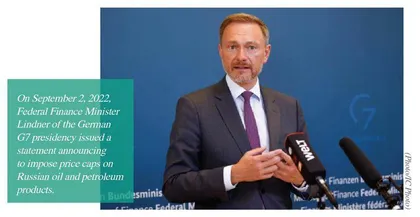New Landscape of Energy Politics and Global Energy Governance
作者: Zhao Hongtu

Since the 1990s, intern ational energy cooperation has advanced on all fronts, and energy governance has become a focal point of global governance. However, with the emerging anti-globalization tide and intensified competition among major countries in recent years, the trend of “politicizing” energy cooperation has been stronger. After the outbreak of the Ukraine crisis, the energy sanctions imposed by the United States and Europe against Russia have brought an “end” to nearly half a century of free trade in energy, highlighting the trend of “bloc-based division” in energy cooperation and causing a certain degree of regression in global energy governance. Under the new circumstances, the international community not only needs to strengthen strategic dialogue and cooperation between energy exporters and consumers, and actively promote the “de-politicization” of international energy, but also needs emerging economies to play a greater role in promoting global energy governance.
Degeneration of international energy politics
With the regression of globalization and the rise of nationalism, the geopolitical games of major countries have been remarkably intensified, and the political and security attributes of energy have once again come to the fore. In order to achieve their geopolitical and strategic goals, the United States and Europe frequently impose energy sanctions on energy exporting countries, advocate energy and economic “decoupling” from some countries, and extend competition among major countries to the energy sector, which fragments the global market and reverses the globalization of trade in energy.
First, energy has become more “politicized”. The United States is a veritable global “superpower of sanctions” and also a prime example of using energy as weapons back against oil-producing countries. In recent years, the United States has even redoubled the use of energy sanctions and other means to pursue its national strategic interests. During his presidency, Donald Trump has repeatedly accused the Organization of Petroleum Exporting Countries (OPEC) of pushing up oil prices, threatened to enact the “No Oil Production and Export Cartel Act” (NOPEC) and imposed sanctions on Saudi Arabia and other OPEC members. In the Russia-Europe energy game, the United States has been obstructing the Nord Stream 2 pipeline project since its conception. After the Ukraine crisis broke out, the European energy crisis was aggravated mainly by the escalation of energy sanctions imposed by the United States and Europe against Russia. In 2022, the International Energy Agency issued 10 recommendations for the EU to reduce energy dependence on Russia, which were mainly non-market measures. Many multinational companies also chose to sacrifice commercial interests and submit to political will.
In the context of major country competition, the trend of “de-globalization” and “decoupling” in the United States and the West has also affected the clean energy sector. China-US clean energy cooperation has taken a great hit, as many of the previous cooperation projects on renewable energy and energy efficiency ceased to exist. The United States has been actively advocating the “decoupling” from China by playing up China’s strengths in the clean energy chain and the “threat” it poses to the United States and the West. In 2021, the United States banned exports of heavy water and key components for nuclear power plants to China and imports of photovoltaic modules made in Xinjiang, China. In February 2022, the US Department of Energy released America’s Strategy to Secure the Supply Chain for a Robust Clean Energy Transition to maintain its global leadership in clean energy manufacturing and innovation. The EU has also called for greater protection and review of clean energy technologies. There were even some voices that compared getting rid of clean energy dependence on China to getting rid of energy dependence on Russia, arguing that “Russian energy today could be China’s green high technology in the next conflict”.
Second, the energy game has rebounded on all fronts. With the escalation of US and European energy sanctions against Russia, Russia-Europe energy relations continue to deteriorate. On 27 September 2022, Nord Stream 1 and Nord Stream 2 pipelines exploded under the sea, making the geopolitical energy conflicts between Russia, the United States and Europe even more complicated. Europe is actively exploring new import channels to get rid of its energy dependence on Russia, further intensifying competition in energy trade and markets with Asia.
In terms of energy geopolitics, the energy game between Russia, the United States and Europe is becoming increasingly complicated. On one hand, after the Ukraine crisis, the United States first pressured the EU to escalate energy sanctions against Russia, and then joined the EU and the G7 to place a cap on Russian oil prices. European-Russian energy cooperation has continued to weaken, with only a few countries in the EU, such as Hungary, remaining supportive of energy cooperation with Russia. On the other hand, Russia has taken unprecedented countermeasures by accelerating the “eastward” and “southward” process of its energy strategy. On 27 December 2022, Russian President Vladimir Putin signed a presidential decree imposing special economic measures in response to the West’s cap on Russian oil prices. In addition, geopolitical competition on new energies such as key minerals and competition for clean energy supply chains and technologies have become more intense.